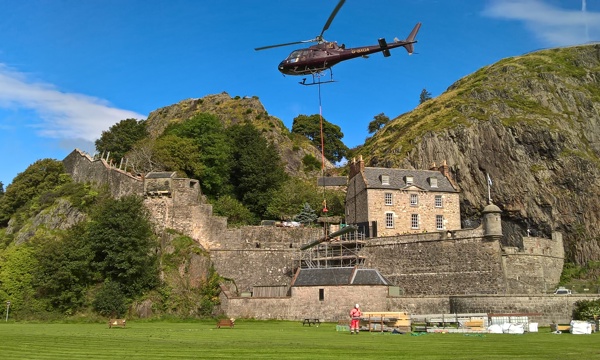A helicopter lift will signal the start of a £42,000 conservation project by Historic Environment Scotland (HES) to restore a stone sentry turret at the castle where Mary, Queen of Scots took shelter before fleeing for France.
The sentry cupola, which would have provided shelter to soldiers standing watch over Dumbarton, was constructed during renovations which took place between 1600 and 1700. These were intended to convert the medieval castle visited by Scottish royalty into a modern artillery fortress. In winter 2016, it was struck by lightning, and since then HES has been developing plans to conserve the prominent feature.
Debris and surviving stonework from the tower was removed, with HES stonemasons hand-carving replacement stones for the ornate domed cupola roof. Work to restore the turret is now beginning on site, however due to the challenges posed by the location of the tower, a helicopter is being used to lift materials to the upper levels of the castle.
Scaffolding will then be erected around the remains of the turret to allow staff access, and to build up traditional wooden propping to support the roof as it is reconstructed. Once the keystone at the summit of the dome has been fitted, the roof will be self-supporting and the props removed. HES stonemasons will then undertake repointing work on the turret and the surrounding area, before the scaffolding is removed in Spring 2018.
By combining the conservation and traditional craft skills of our stone masons we will be able to re-construct the tower, retaining as much historic fabric as possible.
"The geology of the rock was of course a key attribute in its use as a place of fortification - the ease of defending the site and the dramatic vista from the rock were key to its success. Those same attributes present us with challenges in transporting heavy materials safely to the top of the rock. In this scenario it is often quicker and safer to use a helicopter to transport the materials to where they are needed. This work forms part of a wider programme of investment at the Castle, which will be running until next spring. We will provide interpretation to visitors to explain this latest chapter in the castle’s story.”
The project to restore the sentry cupola is part of a wider programme of investment in Dumbarton Castle by HES. This has also seen invasive ivy and scrub plants cleared from parts of the Castle and Rock, improvements to utilities, and extensive conservation work on the Governor’s House. Further work to conserve the Magazine and French Prison is planned through 2018 and 2019.
About Historic Environment Scotland (HES)
- We are the lead public body charged with caring for, protecting and promoting the historic environment. We will lead on delivering Scotland’s first strategy for the historic environment, Our Place in Time.
- Historic Scotland is a sub brand of HES.
- View our press pack and keep up to date by registering for media release email alerts. If you wish to unsubscribe, please contact us.
Year of History, Heritage and Archaeology 2017
2017 is the Year of History, Heritage and Archaeology (HHA), a year that will celebrate Scotland’s people, our distinct culture and traditions, our historic landscapes, attractions and icons as well as our hidden gems and amazing stories. From World Heritage Sites to ancient monuments, listed buildings to historic battlefields, cultural traditions to our myths, stories and legends, 2017 is the year to explore Scotland’s fascinating past. This is a Scottish Government initiative being led by VisitScotland and a variety of partners.
Get involved on Twitter with #HHA2017
Follow Historic Environment Scotland
Twitter: @HistEnvScot | @welovehistory
Facebook: @HistoricEnvScotland | @VisitHistoricScotland
For further information, please contact:
Seumas Skinner
Historic Environment Scotland Media Office
Direct Line: 0131 668 8714
Mobile: 07776 243 809
seumas.skinner@hes.scot


